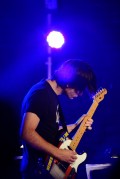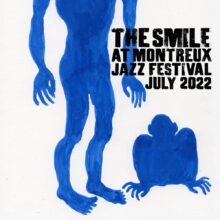Since their humble beginnings in 1993 with Pablo Honey and the song ‘Creep’, Radiohead have developed to become one of the greatest bands of recent times.
Their live shows are stunning and albums adventurous. After cracking the market wide open in 1997 with OK Computer, the sound of Radiohead has evolved with each album with the next few albums Kid A and Amnesiac confusing critics but delighting fans.
Australia recently played host to Radiohead live for the first time since 1998 and unfortunately the tour was cut short after singer Thom Yorke developed problems with his throat.
Their unscheduled final show turned out to be Monday, April 26. After the show, guitarist Johnny Greenwood sat down with Tim Cashmere for a Radiohead rav.
Johnny Greenwood: One doesn’t want to be arse-ing around before the show. Now it’s after the show I can say any old rubbish.
Tim Cashmere: That’s true. It doesn’t matter and if anyone pulls you up on it later just go “Ah! It was after the show.”
JG: I was all sweaty, I was confused…
TC: Anyway, let’s talk about ‘Hail to the Thief’. It’s quite a full-on listen. How planned out is an album like this?
JG: Well every album is only a collection of songs from the era in which they were written and recorded. There is a strange moment when you have a pile of multi-track tapes of about twenty songs or fifteen songs or whatever and then a week later you’ve got them in an order and it’s suddenly an album. It sort of comes as a surprise and I think people don’t really realise how disparate these songs really are until suddenly they’re all glued together. You kind of don’t set out to make an album, you just get a bunch of songs and start recording and it’s only afterwards you start thinking “Is there meant to be a message here?” and before you know it, you do what you’re trying to do now. That is after the fact trying to make sense of it. That’s the thing we try and do as well and we try and do it too. I’m not belittling what you’re saying, but it comes as a trip to us as well if there’s something running through it or a thread or whatever.
TC: It’s almost a little misleading the way you’ve set out the album where each track has an alternate title. Where did the idea for that come from?
JG: I think Thom is just very keen on having long titles and he felt like inflicting that on everybody. Also they reveal another side to the song you know? It’s like what the song is really about or just showing a different side to it.
TC: …and you’re back with producer Nigel Godrich. That’s becoming quite the collaboration.
JG: Yes that’s true. He’s our age and he just kind of grew up with us so when we’re recording songs we’re working and when we’re not recording songs we’re talking about the home computers we had in the eighties and reminiscing and playing computer games together. He’s one of us, it’s not like he’s an overseer in the traditional sense of a producer who is usually older than you. And he’s getting a good tally of records behind him.
TC: ‘Hail to the Thief’ seems to be, not quite going back to your original sound, but kind of a nod in that direction.
JG: I think for a few years now we’ve been trying to get into a space where we’ll play any instrument in any style at all that we’re capable of to make the song work, whatever the song is. We shouldn’t have hang ups about using laptops or pianos or guitars or anything and that’s where we’re trying to get to and this is the closest that we’ve got. So if the song calls for building drum machines and writing programs then we’ll do it and if it needs real instruments then we’ll do that too. It’s nice just to be able to grab instruments and use them like that. You don’t have to just be the bass player; you just use it when you need to. You’re not sitting around waiting to play your guitar part like I’m sure it must get for some bands. It’s cool, we make music together, we don’t just call people up when we need them.
TC: So you actually built drum machines and things like that. That’s not something that I can claim to be an expert on, but surely you could’ve found something that could do what you wanted to do.
JG: Yeah but the logic with that was like in the eighties and late seventies presumably there were technicians at places like Yamaha building drum machines and synthesisers to put in a box. We were thinking like what is a snare drum? Well it’s sort of white noise, with an envelope creating the shape of the white noise and that sounds a bit like a real snare drum, then work on it and then move on. So we went back to that stage and thought “How else can we do it?” using similar equipment today? It’s just an interesting project really and it’s evolved into one of those boxes on stage with all the wires and things going on.
TC: Now you’re probably the best person in the band to ask this question to; how natural does it feel to put a new sound into a song? Because I saw you tonight and you seemed to be playing more instruments than anyone else in the band. You had a bit of everything up there.
JG: Jack of all trades, master of none my mother tells me!
TC: Is it true?
JG: Yeah it’s true because I can only play all these different instruments in one style. Put me in another band to play guitar and it’d probably be quite embarrassing and disappointing for everybody because I know what I can do and I’m showing everybody, but if you ask me to play some blues or jazz, it’d just be awful! It’s the same with the glockenspiel and everything else. I don’t really feel any different playing guitar or glockenspiel; I just find them both quite exciting for various reasons. I can’t really explain it more than that.
TC: Like you said, a jack of all trades, master of none.
JG: That’s right! It’s the way to go because you just stay interested in what you’re doing and you never feel constricted by anything.
TC: Well you certainly have picked a good band to wind up in. Surely you’re happy with it!
JG: Yeah. Well Thom comes into a room and plays you a song that’s either written or half written and it’s a luxury. The pressure is to not fuck up this great song rather than the pressure being to write this great song. What you do when Thom comes in and plays a song is think “Geez, we have to record this!” You have to make it sound better than him playing it by himself, which already sounds amazing, so that’s our nightmare in a way and our motivation.
TC: So there has been the occasional diversion from Radiohead, Thom played with PJ Harvey and you had the Bodysong soundtrack, which incidentally had a little bit of jazz on there!
JG: There was, but I wasn’t playing it you see! I craftily got other people in. I stuck to where I couldn’t go wrong and used the radio.
TC: That was actually the soundtrack to a movie. Had you seen the movie before you made the music?
JG: Over and over. At least little clips of it over and over. I’d get twenty minutes of footage usually with a note saying this is going to be five minutes eventually, so do five minutes of music. It’s a dream situation for someone making that because you can do a song or a piece of music and not worry about how long it’s going to go or have specific points in the music. Whereas in most films you have to leave a gap for them to talk for someone to say something, but there was none of that. That really helped.
TC: Do you think as far as movies go that it’s better to write things for the movie or in the case of say ‘Vanilla Sky’ which had ‘Everything in its Right Place’ have the song already written?
JG: Yeah you see, I’ve always said and always thought that it’s always going to be better to write songs for a film, but Vanilla Sky was amazing, it worked. There’s always going to be times when it works. I suppose what was annoying me was the whole thing, which I think is dying out, but it was certainly happening a few years ago, a big movie doing a bunch of rock hits and putting them on an album or soundtrack and there was the whole synergy of the rock soundtrack helping the careers of musicians all in one media circle, which is kind of naff really. Songs that aren’t even on the film being on the soundtrack, remember all that?
TC: …and going back to ‘OK Computer’. I remember reading an interview with someone in the band. You had said you were going to make a video for every single song on the album. What happened to that?
JG: Well we’d kind of run out of money and time and effort. Only two or three of the first five were getting shown so why make the other six? Nobody can see them. It takes a lot of time for directors to come up with all the ideas. Yeah it was a good idea, but nobody would show them at that point.
TC: Would you ever do that for a future album?
JG: We sort of did that for ‘Kid A’. We made lots of short films. Some of them were shown and some of them weren’t.
TC: It’s been six years since you’ve been here. It’s been one hell of a long time. Where have you been, what have you been doing?
JG: We’ve been everywhere else. No, that’s not entirely true. There are still places we’ve never been, like Korea and South America and we really should one day. So yeah, it’s very hard to justify only coming three times in ten years, but like I said there are places that we’ve never been and we have people waiting for us there really.
TC: So count yourself lucky Australia!
JG: No I’m not saying that because we, you know because we love it and we just had four or five days in Sydney and it was the best time we’ve had on tour for years really, so no excuse really. We just try and do good shows.
TC: …and your live show certainly has come a long way since the last time you were out here and I didn’t see you the first time you were out here, but I’m sure it’s come a long way since then.
JG: Yeah we were at the Esper… uhhh… Espline… The Esplanade! With the sticky floor and the smoke?
TC: Yeah that’s The Espy. Wow, that’s a great memory.
JG: Then we played further down the road at this ballroomy place.
TC: Each time you come back you’re leaping and bounding and now you’re here (Rod Laver Arena).
JG: Well the Esplanade, you can only leap from there can’t you? What’s it like now?
TC: Pretty much the same, it’s smoky, it’s sticky, but it’s got character!
JG: That’s true.
TC: Now it almost sounded, again from interviews I’d read from you, around the time of ‘Kid A’ that Radiohead had become a little uncomfortable with your fame.
JG: Well it’s okay because Radiohead are quite famous, yet we’re still quite anonymous. Thom gets it a little bit more because he’s on the videos and the covers of magazines, people leave him alone as well though. You can be famous as a face and people not really know what you do, whereas people who recognize us know what we do. That’s a nice thing to have.
TC: Let’s talk about this live show that we’ve just seen. Whoever designed that set is amazing. The lighting was great, everything was great.
JG: Andi Watson. Yes, he’s a star! Great work Andi. We were out with him last night at that Veggie place in the St. Kilda Sea Baths. It was great and we just talked about lights all evening. He’s been with us for ten years now.
TC: So do you go to him and say “I want it to look like this.”?
JG: No I’m colorblind, so I can’t. He’ll get excited about ideas and tell us and we’ll either get excited about them or calm him down. He talks with Thom about colours and designs and yeah. He’s great.
TC: Well Johnny, thanks for your time.
JG: Great!
——————————————————————————————————————————————
Never miss a story! Get your free Noise11.com daily music news email alert. Subscribe to the Noise11 Music Newsletter here
Listen to the Noise11 Music News channel now at iHeartRadio
Follow Noise11.com on Facebook and Twitter
NOISE11 UPDATES are now in Apple News
















